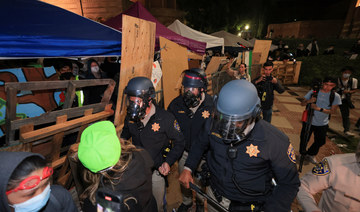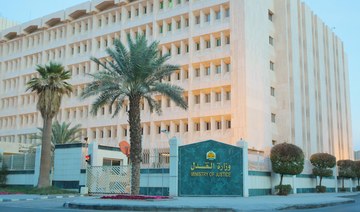WASHINGTON/LONDON: US President Donald Trump on Wednesday posted anti-Islam videos on Twitter that had originally been published by a leader of a fringe, far-right British party who was convicted earlier this month of abusing a Muslim woman.
Jayda Fransen, deputy leader of the anti-immigration Britain First group, posted the videos on Wednesday which she said showed a group of people who were Muslims beating a teenage boy to death, battering a boy on crutches and destroying a Christian statue.
Trump’s decision to re-tweet the videos prompted criticism from both sides of the Atlantic.
“I hope our government will condemn far-right retweets by Donald Trump,” Jeremy Corbyn, leader of Britain’s opposition Labour Party, wrote on Twitter. “They are abhorrent, dangerous and a threat to our society.”
Reuters was unable to immediately verify the videos and Fransen herself said they had come from various online sources which had been posted on her social media pages.
“I’m delighted,” Fransen, who has 53,000 Twitter followers, told Reuters, saying it showed the US president shared her aim of raising awareness of “issues such as Islam.”
As a candidate, Trump called for “a Muslim ban” and, as president, has issued executive orders banning entry from some citizens of multiple countries, although courts have partially blocked them from taking effect.
Britain First is a peripheral political party which wants to end all immigration and to bring in a comprehensive ban on Islam, with anyone found to be promoting the religion’s ideology to be deported or imprisoned.
The group, which attracts a few hundred protesters to its regular street demonstrations, states on its website it is a “loyalist movement” but critics say it is simply racist.
Fransen was fined earlier this month after being found guilty of religiously aggravated harassment for shouting abuse at a Muslim woman wearing a hijab.
Last week, she was charged by the police in Northern Ireland with using threatening, abusive or insulting words in a speech at a rally in Belfast in August.
Along with the group’s leader, she was also charged in September with causing religiously aggravated harassment over the distribution of leaflets and posting online videos during a court trial involving a number of Muslim men accused and later convicted of rape.
Politicians in Britain called on Prime Minister Theresa May’s government to condemn Trump while the Council on American-Islamic Relations (CAIR), the largest US Muslim civil rights organization, said it was an incitement to violence.
“These are actions one would expect to see on virulent anti-Muslim hate sites, not on the Twitter feed of the president of the United States,” CAIR National Executive Director Nihad Awad said in a statement.
David Duke, a former leader of the Ku Klux Klan, praised Trump for his posts.
“He’s condemned for showing us what the fake news media won’t,” Duke wrote on Twitter. “Thank God for Trump! That’s why we love him!“
There was no immediate response from May’s office, and Fransen said Trump’s re-tweets showed his outrage at her treatment by the media and the authorities.
“The important message here is Donald Trump has been made aware of the persecution and prosecution of a political leader in Britain for giving what has been said by police to be an anti-Islamic speech,” she said.
“He (Trump) stands for free speech and he won’t be deterred by any petty left-leaning journalist in Britain saying he shouldn’t be re-tweeting any individual.”
UK lawmakers condemn Trump for retweeting anti-Muslim videos from far-right party
UK lawmakers condemn Trump for retweeting anti-Muslim videos from far-right party

Russian troops enter base housing US military in Niger, US official says
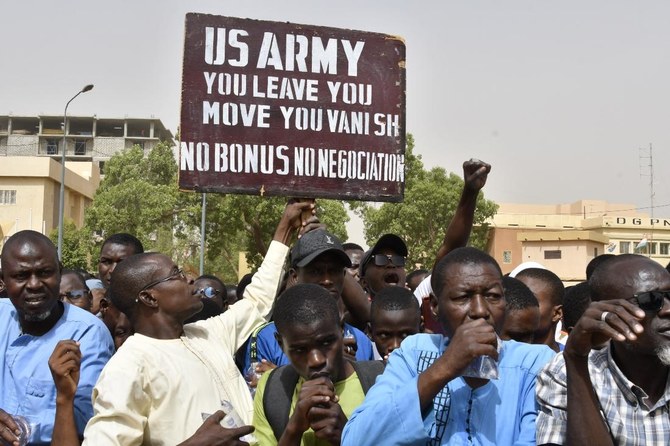
The military officers ruling the West African nation have told the US to withdraw its nearly 1,000 military personnel from the country, which until a coup last year had been a key partner for Washington’s fight against insurgents who have killed thousands of people and displaced millions more.
A senior US defense official, speaking on condition of anonymity, said Russian forces were not mingling with US troops but were using a separate hangar at Airbase 101, which is next to Diori Hamani International Airport in Niamey, Niger’s capital.
The move by Russia’s military, which Reuters was the first to report, puts US and Russian troops in close proximity at a time when the nations’ military and diplomatic rivalry is increasingly acrimonious over the conflict in Ukraine.
It also raises questions about the fate of US installations in the country following a withdrawal.
“(The situation) is not great but in the short-term manageable,” the official said.
Asked about the Reuters report, US Defense Secretary Lloyd Austin played down any risk to American troops or the chance that Russian troops might get close to US military hardware.
“The Russians are in a separate compound and don’t have access to US forces or access to our equipment,” Austin told a press conference in Honolulu.
“I’m always focused on the safety and protection of our troops ... But right now, I don’t see a significant issue here in terms of our force protection.”
The Nigerien and Russian embassies in Washington did not immediately respond to a request for comment.
The US and its allies have been forced to move troops out of a number of African countries following coups that brought to power groups eager to distance themselves from Western governments. In addition to the impending departure from Niger, US troops have also left Chad in recent days, while French forces have been kicked out of Mali and Burkina Faso.
At the same time, Russia is seeking to strengthen relations with African nations, pitching Moscow as a friendly country with no colonial baggage in the continent.
Mali, for example, has in recent years become one of Russia’s closest African allies, with the Wagner Group mercenary force deploying there to fight jihadist insurgents.
Russia has described relations with the United States as “below zero” because of US military and financial aid for Ukraine in its effort to defend against invading Russian forces.
The US official said Nigerien authorities had told President Joe Biden’s administration that about 60 Russian military personnel would be in Niger, but the official could not verify that number.
After the coup, the US military moved some of its forces in Niger from Airbase 101 to Airbase 201 in the city of Agadez. It was not immediately clear what US military equipment remained at Airbase 101.
The United States built Airbase 201 in central Niger at a cost of more than $100 million. Since 2018 it has been used to target Islamic State and Al-Qaeda affiliate Jama’at Nusrat Al-Islam wal Muslimeen (JNIM) fighters with armed drones.
Washington is concerned about Islamic militants in the Sahel region, who may be able to expand without the presence of US forces and intelligence capabilities.
Niger’s move to ask for the removal of US troops came after a meeting in Niamey in mid-March, when senior US officials raised concerns including the expected arrival of Russia forces and reports of Iran seeking raw materials in the country, including uranium.
While the US message to Nigerien officials was not an ultimatum, the official said, it was made clear US forces could not be on a base with Russian forces.
“They did not take that well,” the official said.
A two-star US general has been sent to Niger to try and arrange a professional and responsible withdrawal.
While no decisions have been taken on the future of US troops in Niger, the official said the plan was for them to return to US Africa Command’s home bases, located in Germany.
’Show solidarity’: Pro-Palestinian protesters camp across Australian universities
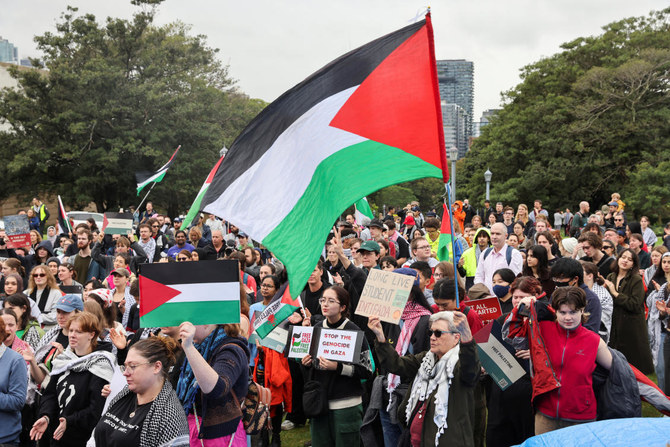
- Pro-Palestinian activists set up an encampment last week outside the sandstone main hall at University of Sydney
- Similar camps have sprung up at universities in Melbourne, Canberra and other Australian cities
SYDNEY: Hundreds of people protesting Israel’s war in Gaza rallied at one of Australia’s top universities on Friday demanding it divest from companies with ties to Israel, in a movement inspired by the student occupations sweeping US campuses.
Pro-Palestinian activists set up an encampment last week outside the sandstone main hall at University of Sydney, one of Australia’s largest tertiary institutions.
Similar camps have sprung up at universities in Melbourne, Canberra and other Australian cities.
Unlike in the US, where police have forcibly removed scores of defiant pro-Palestinian protesters at several colleges, protest sites in Australia have been peaceful with scant police presence.
On Friday, protesters rallied to demand University of Sydney divest from companies with ties to Israel, echoing calls from students in the US, Canada and France.
Standing in the chanting crowd of more than 300 with his two-year old son on his shoulders, Matt, 39, said he came to show it was not just students angry at Israel’s actions in Gaza.
“Once you understand what is going on you have a responsibility to try and get involved and raise awareness and show solidarity,” he told Reuters, declining to give his last name.
Several hundred meters away from the Sydney university protest and separated by lines of security guards, hundreds gathered under Australian and Israeli flags to hear speakers say the pro-Palestinian protests made Jewish students and staff feel unsafe on campus.
“There’s no space for anybody else, walking through campus chanting ‘Intifada’ and ‘from the river to the sea’ it does something, it’s scary,” said Sarah, an academic who declined to give her name for fear of repercussions.
University of Sydney vice chancellor Mark Scott told local media on Thursday the pro-Palestinian encampment could stay on campus in part because there was not the violence seen in the US
While several police cars were parked at the entrance to the university, no police were present at either protest.
Long a stalwart ally of Israel, Australia has become increasingly critical of its conduct in Gaza, where an Australian aid worker was killed in an Israeli attack last month.
Pro-Palestinian protesters said the government had not done enough to push for peace and led the crowd in chants against Prime Minister Anthony Albanese and his government.
‘Saudi Smash’ in Jeddah set to boost table tennis
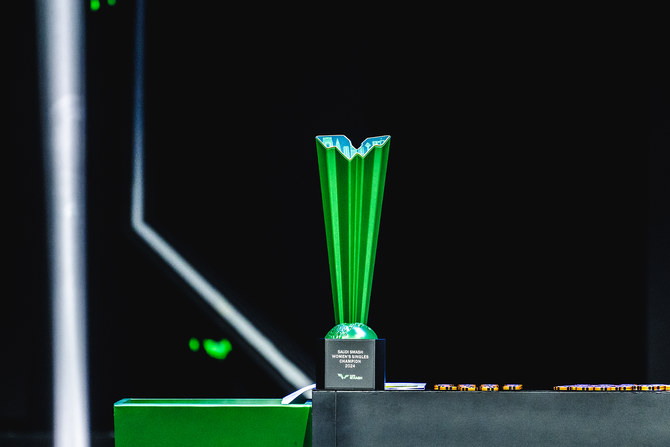
- One of the sport’s biggest events takes place at King Abdullah Sports City from May 4-11
JEDDAH: Table tennis in the Kingdom is set for a boost with the debut of the “Saudi Smash” tournament at Jeddah’s King Abdullah Sports City from May 4 to 11.
The event, organized by World Table Tennis, the Ministry of Sport and the Saudi Table Tennis Federation, is the latest example of the Kingdom’s mission to promote active lifestyles as part of Vision 2030.
Table tennis has grown in Saudi Arabia over the past three years, fueled by investments and initiatives by the STTF and the ministry.
The number of clubs has surged by 50 percent to 181, with nearly 5,000 players registered.
Several Saudi Arabia athletes will compete including Ali Alkhadrawi, Abdulaziz Bu Shulaybi and Turki Almutairi.
The tournament will have equal prize money for the men’s and women’s champions.
The Kingdom’s Vision 2030 transformation plan aims to ensure 40 percent of the country’s people engage in sports.
There has been a 300 percent increase in sports participation since 2015, accompanied by a surge in females taking part.
Professional Fighters League’s Ali Taleb looks to bounce back in Riyadh following first career loss

- Only defeated by Khurshed Kakhorov in his 10-bout mixed-martial arts career
Things did not go quite according to plan when Ali Taleb last stepped inside the Smart Cage of the Professional Fighters League.
With a chance to advance to the bantamweight finale of the inaugural season of PFL Europe, Taleb fell short, losing via unanimous decision to eventual champion Khurshed Kakhorov.
The loss last year was the first blemish on Taleb’s 10-fight professional mixed-martial arts resume, but it also became a bit of a learning experience for the Iraqi-Swedish bantamweight.
“What I learned is not to be jittery, don’t chase the knockout all the time,” Taleb said in a recent interview on the Rondvilan Podcast.
“It was his turn, it was his time to win the million,” said Taleb.
The 26-year-old reigning UAE Warriors Bantamweight Champion added: “There’s still a lot for me to learn, honestly.”
Looking ahead, Taleb has his sights set on his PFL MENA debut in Riyadh on May 10. He will be facing a familiar opponent in Jordan’s Nawras Abzakh, whom he defeated in 2021.
“It’s the first time I’m going to rematch someone,” Taleb said. “It’s going to be good, I’m excited, man.”
Taleb will try to make history by becoming one of the first PFL MENA champions.
He said that Abzakh had asked to face him. “It’s a tournament, but he said ‘I want to fight him.’”
“He’s gonna get a taste,” Taleb continued. “Nothing can stop me now. I’m going to take his soul, and that’s that. This guy won’t stop me.”
He also revealed that he will be defending his UAE Warriors’ title.
“I’m allowed by the PFL to take a fight in UAE Warriors, so I think I’m going to defend my belt there,” Taleb said.
The PFL MENA: Riyadh tournament takes place on Friday May 10 at The Green Halls in Riyadh, Saudi Arabia. All PFL MENA events will air live on MBC Action and SHAHID.
Moroccan photographer Hassan Hajjaj captures the culture of AlUla

- The acclaimed Moroccan photographer discusses his recent show in Saudi Arabia
DUBAI: Early in February this year, Moroccan contemporary artist and photographer Hassan Hajjaj was given a reminder of just how high his star has risen. Within a few days of each other, Hajjaj had shows opening in the US, Morocco, and — as part of AlUla Arts Festival — Saudi Arabia.
Hajjaj’s playful portraiture, which incorporates vivid color, funky clothing (almost all of which he designs himself), geometric patterns, and — often — vintage brands from the MENA region, has made him internationally popular, and his instantly recognizable style has established him as one of the world’s leading photographers.
His show in AlUla consisted of images that he shot in the ancient oasis town in February 2023. That visit was initially supposed to involve shoots with around 20 local people. It’s the kind of thing he’s done a few times before, including in Oman and Abu Dhabi. “It’s always a good opportunity to get to know the culture and the people,” Hajjaj tells Arab News.
But, as he says himself, he arrived in AlUla as “an outsider,” so needed a team on the ground to persuade locals to come and sit (or stand, in most cases) for him.
“It was a bit tough, in the beginning, for them to find people,” Hajjaj explains. “But because it was during a period when lots of art things were happening in AlUla, there were lots of people coming from outside AlUla as well. So we opened it up. I basically said, ‘Just come.’
“In the end lots of people turned up, not just locals — people from Riyadh, Jeddah, and people (from overseas) too. I think I shot around 100 people over a few days. So it was a great opportunity,” he continues. “To get to shoot that many people over three days — organizing something like that for myself might take a year. So, as long as I have the energy, when I get these opportunities — you know, I’m in AlUla with this eclectic bunch of people — I’d rather go and grind it, really work hard, and have that moment.”
A Hassan Hajjaj shoot isn’t your regular portrait shoot, of course. “It’s almost like a performance,” he says. “There’s music, people dress up, it’s like a day out for them, taking them out of themselves for a few hours.”
He followed the same modus operandi in AlUla. “We got an ambience going. It was fun, there was music… I shot in this beautiful old school that was one of the first girls’ schools in Saudi Arabia, from the Sixties. Upstairs was like a museum — everything was like a standstill from the Seventies and Eighties; even the blackboards had the chalk and the writing from that time,” he says.

A crucial part of Hajjaj’s practice is to ensure that his subjects are at ease and feel some connection with him (“comfortable” is a word he uses several times when talking about his shoots). While all his portraits bear his clearly defined style, it’s important to him that they should also show something unique to the people in them.
“It’s that old thing about capturing the spirit of the person in that split second, you know? I’m trying to get their personality and body language in the image,” he says. “Quite often I’m shooting in the street, outdoors, so (the subjects) can start looking at other people, thinking, ‘Are they looking at me?’ So I usually say, ‘Listen. This is a stage I’m building for you. I’m dressing you up, and we’re going to have fun.’ Then I just try and find that personality that can come out and make the image stronger. With some people, though, saying almost nothing can be better — just getting on with it. I try to kind of go invisible so it’s the camera, not the person, that’s doing the work. The best pictures come out when there’s some kind of comfortable moment between me and the person and the camera.”
It’s the way he’s worked since the beginning — a process that developed organically, as most of his early portraits were of “friends or friends of friends.”

“There’s a comfort in that because you have a relationship with them. It made it easy,” he says. “And that taught me about how important it is to build trust with people to get into that comfortable zone. But as time went on, obviously, people could see the stuff in the press or on social media, so then people started, like, asking to be shot in that manner; maybe they’ve studied the poses of certain people and stuff like that, so they come ready to do some pose they’ve seen in my pictures. That’s quite funny.”
The work that was on display over the past two months in Hajjaj’s “AlUla 1445” is a perfect example of what he tries to achieve with his shoots. The images are vibrant, playful, and soulful, and the subjects run from a local goatherder through the AlUla football team to bona fide superstars: the US singer-songwriter Alicia Keys and her husband Swizz Beatz.
Hajjaj says he has a number of favorites “for different reasons,” including the goatherder.

“He brought in two goats and it became quite abstract when you put all of them together. I was playing with that notion of the person; you could see that’s his life and even the goats look happy,” he explains. “I wanted to make sure they had that shine in the image as well. I got some great shots of him.”
The Alicia Keys and Swizz Beatz shoot has been a long time in the making. Hajjaj first met Swizz Beatz a decade ago, and they have been in touch intermittently ever since. The idea of a shoot with Keys first came up about five years ago, but logistics had always got in the way. But since they were playing a concert in AlUla at the same time as Hajjaj was there, it finally happened, on Hajjaj’s last day, with perhaps an hour left before the light faded.
I ask Hajjaj if his approach to shooting celebrities differs from his shots of “ordinary” people.
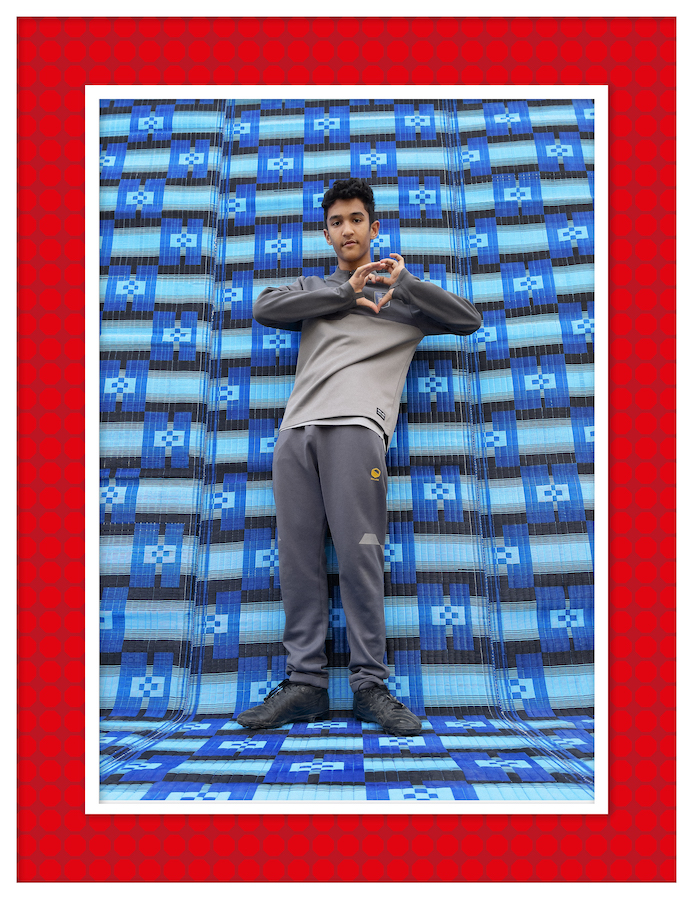
“There’s probably not that much difference,” he says. “They’re coming into my world, so, again, it’s just making sure they’re comfortable with you and you’re comfortable with them; not looking at them (as celebrities). The only thing is you have to imagine they’ve been shot thousands of times — by top photographers, too — so they’re going to have their ways. So I just have to lock in with them and find that comfortable space between the sitter and me.”
And then there’s Ghadi Al-Sharif.
“It’s a beautiful picture. She’s got this smile, with her hand over her face. For me, that one really presents the light and the energy of AlUla,” Hajjaj says. “It captures the new generation.”


